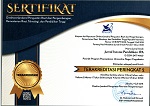Cinta Tanah Air di Era Global
Abstract
This study aimed to analyze the meaning of love for the homeland from time to time, the concept of world citizenship, global citizenship, and cosmopolitanism in the global era, and analyze the urgency of patriotism education in the global era. This study used a qualitative method by explaining the feelings and ideas of the informants regarding the occurrence of a specific behaviour or symptom. The meaning of love for the homeland had shifted from ancient times, medieval times, to modern times. In ancient times, love for the homeland was regional; in the Middle Ages, it was personal; while in modern times, it was more national and national. The concepts of global citizenship, global citizenship, and cosmopolitanism in the global era showed connectivity and interdependence between humans in all parts of the world. The urgency of patriotism education in the global era was related to providing learning materials about global citizenship education or global citizenship education to instil awareness of universal humanitarian issues.
Keywords
Full Text:
PDFReferences
Abi, A. R. (2017). Paradigma Membangun Generasi Emas Indonesia Tahun 2045. Jurnal Ilmiah Pendidikan Pancasila dan Kewarganegaraan, 2(2), 85-90.
Altikulac, A. (2016). Patriotism and Global Citizenship as Values: A Research on Social Studies Teacher Candidates. Journal of Education and Practice, 7(36), 26-33.
Alunaza, H. (2017). Diaspora sebagai Multi Track Diplomacy Indonesia Guna Mewujudkan Masterplan Percepatan dan Perluasan Pembangunan Ekonomi Indonesia. Jurnal Ilmu Sosial dan Humaniora, 22(2), 72-82.
Aquinas, T. (1972). Summa Theologiae. New York: McGraw-Hill.
Awdel, Z. M., Odel, N. M., & Saadi, W. F. (2020). The Rise of the Globalization and Its Effect on the Autonomy of State and Political Economy. Journal of Critical Reviews, 7(6), 998-1000.
Bader, M. J. (2007). The Psychology of Patriotism. New York: Teachers College Press.
Bosio, E., & Torres, C. A. (2019). Global Citizenship Education: An Educational Theory of the Common Good? A Conversation with Carlos Alberto Torres. Policy Futures in Education, 17(6), 745-760.
Bria, M. E., & Suharno. (2018). Pendekatan Kesejahteraan sebagai Strategi Penguatan Nasionalisme Masyarakat di Kawasan Perbatasan. Jurnal Ilmiah Pendidikan Pancasila dan Kewarganegaraan, 3(1), 81-88.
Coleman, M. J., Harris, T. M., Bryant, K. L., & Reif-Stice, C. (2018). A Cultural Approach to Patriotism. Journal of International and Intercultural Communication, 11(3), 173-191.
Conversi, D. (2007). Democracy, Nationalism and Culture: A Social Critique of Liberal Monoculturalism. Sociology Compass, 2(1), 156-182.
Davidov, E. (2010). Nationalism and Constructive Patriotism: A Longitudinal Test of Comparability in 22 Countries with the ISSP. International Journal of Public Opinion Research, 23(1), 88-103.
Hartono, D. (2020). Fenomena Kesadaran Bela Negara di Era Digital dalam Perspektif Ketahanan Nasional. Jurnal Kajian Lemhannas RI, 41(2020), 15-34.
Gellner, E. (1983). Nations and Nationalism. London: Cornell University Press.
Golmohamad, M. (2009). Education for World Citizenship: Beyond National Allegiance. West Sussex: John Wiley & Sons.
Gizatova, G., Ivanova, O., & Gedz, K. (2017). Cosmopolitanism as a Concept and a Social Phenomenon. Journal of History Culture and Art Research, 6(5), 25-30.
Green, M. F. (2012). Global Citizenship-What are We Talking About and Why Does it Matter?. Washington DC: NAFSA.
Hayes, C. J. H. (1960). Nationalism: A Religion. New York: Macmillan.
Himes, M. J., & Himes, K. R. (1993). Fullness of Faith: The Public Significance of Theology. New York: Paulist Press.
Horvat, K. V. (2020). Cosmopolitan Patriotism. Berlin: Springer International Publishing.
Hroch, M. (2019). The Nation as the Cradle of Nationalism and Patriotism. Nations and Nationalism, 26(1), 5-21.
Kahne, J., & Middaugh, E. (2007). Is Patriotism Good for Democracy?. New York: Teachers College Press.
Kantorowicz, E. H. (1957). The King’s Two Bodies. A Study in Medieval Political Theology. Princeton: University Press.
Kedourie, E. (1960). Nationalism. London: Hutchinson University Library.
Kleinig, J., Keller, S., & Igor, P. (2015). The Ethics of Patriotism a Debate. West Sussex: John Wiley & Sons.
Kwak, J. (2013). Nationalism and Democracy Revisited the Limits of Democratic Nationalism in South Korea. The Korean Journal of International Studies, 11(1), 143-171.
MacIntyre, A. (2003). Is Patriotism a Virtue. New York: Routledge.
Mao, Z. (2014). Cosmopolitanism and Global Risk: News Framing of the Asian Financial Crisis and the European Debt Crisis. International Journal of Communication, 8(2014), 1029-1048.
Maritain, J. (1951). Man and State. Chicago: Chicago University.
Martell, L. (2011). Cosmopolitanism and Global Politics. Political Quarterly, 82(4), 618-627.
Merry, M. S. (2009). Patriotism, History and the Legitimate Aims of American Education. West Sussex: John Wiley & Sons.
Morley, C. (2008). Critical Reflection as a Research Methodology. New York: Nova Science Publishers.
Nurwardani, P., Saksama, H. Y., Kuswanjono, A., Munir, M., Mustansyir, R., Nurdin, E. S., et al. (2016). Pendidikan Pancasila untuk Perguruan Tinggi. Jakarta: Direktorat Jenderal Pembelajaran dan Kemahasiswaan Kementerian Riset, Teknologi, dan Pendidikan Tinggi Republik Indonesia.
Nurwardani, P., Saksama, H. Y., Winataputra, U. S., Budimansyah, D., Sapriya, Winarno, et al. (2016). Pendidikan Kewarganegaraan untuk Perguruan Tinggi: Buku Ajar Mata Kuliah Wajib Umum Pendidikan Kewarganegaraan. Jakarta: Direktorat Jenderal Pembelajaran dan Kemahasiswaan Kementerian Riset, Teknologi, dan Pendidikan Tinggi Republik Indonesia.
Ravitch, D. (2007). Celebrating America. New York: Teachers College Press.
Republik Indonesia. (2003). Undang-Undang Republik Indonesia Nomor 20 Tahun 2003 tentang Sistem Pendidikan Nasional. Lembaran Negara Republik Indonesia Tahun 2003 Nomor 78. Tambahan Lembaran Negara Republik Indonesia Nomor 4301.
Republik Indonesia. (2012). Undang-Undang Republik Indonesia Nomor 12 Tahun 2012 tentang Pendidikan Tinggi. Lembaran Negara Republik Indonesia Tahun 2012 Nomor 158. Tambahan Lembaran Negara Republik Indonesia Nomor 5336.
Rizvi, F., & Choo, S. S. (2020). Education and Cosmopolitanism in Asia: An Introduction. Asia Pacific Journal of Education, 40(1), 1-9.
Robinson, J., & Alexander, C. (1951). Ancient History: From Prehistoric Times to the Death of Justinian. New York: Macmillan.
Schattle, H. (2009). Global Citizenship in Theory and Practice. New York: Routledge.
Sturzo, D. L. (1946). Nationalism and Internationalism. New York: Roy Publishers.
Subaryana. (2012). The Impact of History Learning to Nationalism and Patriotism Attitudes in the Globalization Era. International Journal of History Education, 13(1), 41-57.
Sutrisno, Sapriya, Komalasari, K., & Rahmad. (2021). Implementasi Model Pembelajaran Proyek Warga Global dalam Pembelajaran Pendidikan Kewarganegaraan. Jurnal Ilmiah Pendidikan Pancasila dan Kewarganegaraan, 6(1), 155-164.
Sutton, J., & Austin, Z. (2015). Qualitative Research: Data Collection, Analysis, and Management. The Canadian Journal of Hospital and Pharmacy, 68(3), 226-231.
Tridiatno, Y. A. (1998). Understanding Patriotism in Gaudium et Spes. Manila: Ateneo de Manila University.
Westheimer, J. (2007). Pledging Allegiance: The Politics of Patriotism in America’s Schools. New York: Teachers College Press.
Wijayanto, R. J., & Marzuki. (2018). Pendidikan Bela Negara sebagai Tonggak Peradaban Jiwa Patriotisme Generasi Muda. Jurnal Ilmiah Pendidikan Pancasila dan Kewarganegaraan, 3(2), 186-191.
DOI: http://dx.doi.org/10.17977/um019v6i2p371-382
Refbacks
- There are currently no refbacks.
Copyright (c) 2021 Jurnal Ilmiah Pendidikan Pancasila dan Kewarganegaraan

This work is licensed under a Creative Commons Attribution 4.0 International License.
View My Stats












